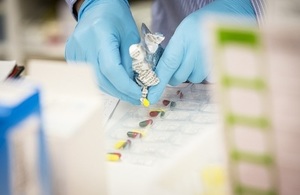£32 million competition launched for AMR research
DHSC will award up to £32 million of capital funding to the NHS, universities and research organisations for research into antimicrobial resistance (AMR).

This funding will be awarded through open competition by the National Institute for Health Research (NIHR), on behalf of the Department of Health and Social Care (DHSC).
The purpose of this funding is to support capital investment in buildings (including refurbishment) and equipment to strengthen the UK’s AMR research capability in order to:
- develop innovative approaches to tackling AMR
- establish a body of researchers with a wide range of skills and expertise relevant to AMR
- encourage external funding for AMR research
All NHS trusts, higher education institutions and not-for-profit UK research organisations (including the NHS and public sector agencies and research establishments) in the UK are eligible to apply.
Funding will be awarded for a 2-year period starting on 1 April 2019. All funding provided to successful applicants must be spent by 31 March 2021.
The closing date for applications is 1pm on 6 December 2018. More information is on NIHR’s website.
Resistance to all antimicrobials, and especially bacterial resistance to existing antibiotics, is increasing. It is now posing a serious threat to health both in the UK and globally, and risks undermining the major improvements in medicine that have been made in recent decades.
Improving knowledge and understanding of AMR is an important part of the UK’s AMR strategy. In response to the independent review on AMR, the government set out what it would do to measure progress on tackling AMR and committed additional investment.
Chief Medical Officer, Professor Dame Sally Davies, said:
Without dedicated efforts to combat antimicrobial resistance, modern medicine as we know it could be lost.
Funding new and innovative approaches to tackle the problem is crucial, and this substantial capital funding will be a significant step towards strengthening UK-based AMR initiatives.